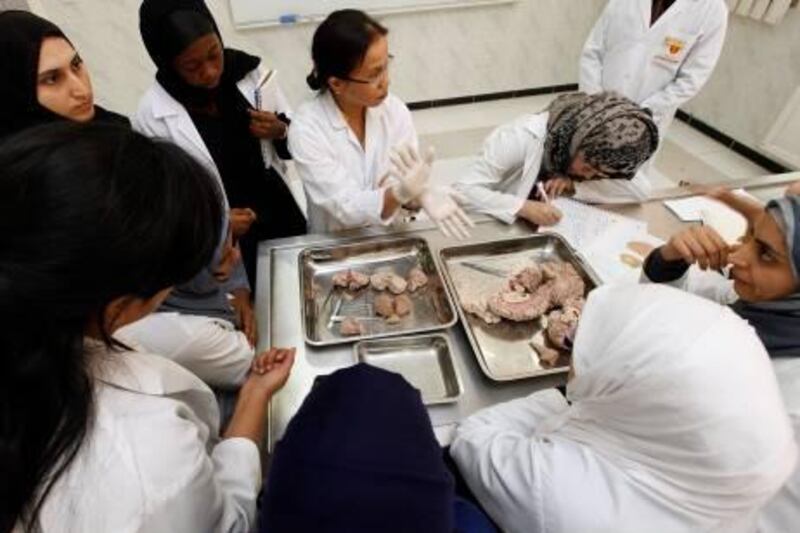AJMAN // Annual tuition fees at Gulf Medical University (GMU) are to rise by Dh10,000, making it more expensive than any other medical school in the country.
The fees will increase from Dh85,000 a year to Dh95,000 from September. The university's provost, Prof Gita Raj, blames the increase on the cost of building research and recreation facilities, as well as a rising wage bill.
The student handbook guarantees that annual increases will not exceed 15 per cent but even this, say students, makes things tough.
Abdullah al Ali, 21, is in his third year. He said the Dh10,000 annual increase would be hard for his parents, who from September will also have to foot the bill for his younger brother, Abdulrahim, 17, who is following him to GMU.
He said: "When I started, they had this amount in their head. It's not fair for students already here to have to find Dh10,000 extra each year. Increase it for new students, but not for those of us already here."
Shazia Gani, 26, also in her third year, said that as her next two years would be spent off campus doing clinical practice, she would see none of the benefits of the expanded campus that necessitated the increase.
Prof Raj said the fees needed to rise for the university to grow. In 2009, they increased from Dh75,000 to Dh85,000.
"There were years when the fees didn't increase, but that was when we were focusing solely on teaching, and that's not enough," she said.
Last year alone, researchers at the university published 50 papers in journals including the Pakistan Journal of Medical Sciences and the Italian Journal of Public Health. "We need to be more productive with our research and community outreach," Prof Raj said.
As the university was accredited by the Ministry of Higher Education and Scientific Research, Prof Raj said standards must not drop and "corners cannot be cut", although she acknowledged the increase was not ideal for students. She would prefer, she said, to apply fee increases only to new students.
Lodging fees have also increased. In 2007, a single bedroom in university accommodation cost Dh15,500 and a shared room Dh12,500.
In 2008, these costs rose to Dh23,500 and Dh15,500, before falling last year to Dh20,000 and Dh12,500.
Students at the University of Sharjah pay just Dh1,500 a year for a shared room, although luxury rooms are also available for Dh15,000.
Students at Ras al Khaimah's Medical and Health Sciences University (RAKMHSU) pay Dh7,500 for a shared room. Prof Raj said she was bound by old contracts. When these expired, she said she hoped to offer cheaper alternatives.
Mr al Ali said that since he moved into the university accommodations, 15 of the 20 students had left, including him, seeking cheaper places to stay elsewhere.
Dubai Medical College in Dubai, the country's first medical school, has also increased its fees by similar amounts in recent years. In 2005, students paid Dh60,000 per year. By 2007 the fees rose to Dh70,000 and in 2009, they increased again to Dh80,000. Shared accommodation costs Dh10,000 per year plus an initial payment of Dh5,000.
Fees at RAKMHSU are the country's lowest, at Dh70,000 per year, and have increased only once, by Dh5,000, since 2007.
Dr Gurumadhva Rao, the vice chancellor of RAKMHSU, said about 40 per cent of the students - Emirati and expatriate - received scholarships from the Sheikh Saqr Programme for Government Excellence. For the rest, the university tried to keep its fees low to compete.
"The whole country is going through a recession so the economic condition isn't encouraging," Dr Rao said.
GMU does not offer similar scholarships. Prof Raj said that because it had no government support, the university was entirely dependent on revenue from tuition fees.
Dr Rao said: "Fee increases are an added pressure for the parents, so we thought we'd be parent-friendly. Keeping fees low puts extra pressure on the institution, though, as maintenance has increased.
"We thought it would also attract more students, especially for nursing, pharmacy and dentistry, to keep our fees the same."
Fees for medical students at the University of Sharjah are Dh82,000. The university's chancellor, Samy Mahmoud, said that was competitive, even with other programmes that were much cheaper to deliver.
"Medical education is much more expensive in other universities that have much less to offer," he said. "It is amazing that some of our competitors charge nearly Dh80,000 for educational programmes such as business and humanities, which cost considerably less to offer than medical education."






